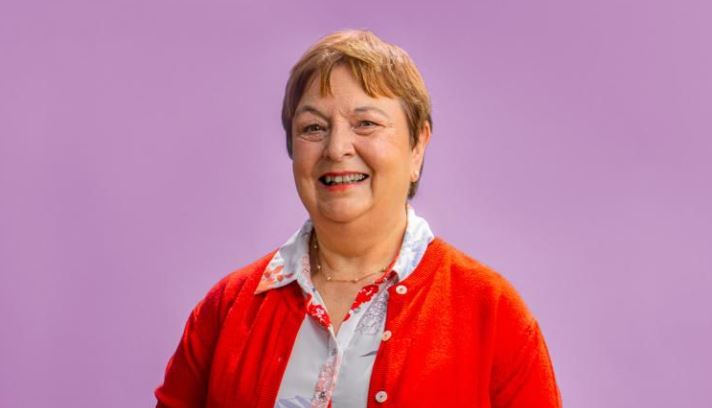Ruth’s story
My name is Ruth. I’m 65 years old, and I’m currently living well with a diagnosis of vascular dementia.

Ruth
I was a Registered General Nurse for 40 years. First in the military, latterly specialising in orthopaedics. It was a career I loved. It gave me huge fulfilment and challenged me every single day. It was on one of these days that, unbeknownst to me, I suffered a stroke.
I knew something was wrong when I left for work one morning and couldn’t turn the car ignition or disable the handbrake. Something wasn’t right. That triggered a series of events which led to my diagnosis of vascular dementia, but it wasn’t a straightforward path to get there. I saw an orthopaedic specialist to investigate repetitive strain injury, and then a consultant who suggested a brain tumour. Eventually a scan confirmed that I’d actually had at least two strokes. Loss of speech and mobility led to around a year off my work. When I did feel fit enough to return, I moved to desk duties to avoid the physically-demanding side of nursing – and that’s when problems started to emerge.
Technology had never been my forte but suddenly I was unable to remember how to get into the computer day-to-day. I was losing track of what I was doing. Back for more tests. Back for another meeting with a consultant. In a short five minute meeting, he told me very simply and very plainly:
“You have vascular dementia, we don’t need to follow up.”
I felt totally bewildered. My husband and I just looked at each other, unable to take in what we’d just been told. Surely there was a better way to break that news? It just wasn’t right. My GP, however, was wonderfully supportive. She spent time talking things through. She understood the knock-on effects and that life was about to change. I was 57 years old.
With a diagnosis of dementia, my licence had to be revoked pending further investigation. At this point, my husband was seriously ill. I was caring for him, and driving him to hospital appointments. We lived rurally, several miles from the nearest town and hospital, so we had no choice but to relocate. It was a big upheaval – I’m a country girl at heart – but we needed to be practical and move to a bigger town. That was seven years ago and since then, I’ve made new friends and have the reassurance of being well connected. Another big change came once I was diagnosed. I resigned from my position as a Registered General Nurse. Not because I’d made any errors or misjudgements – I just felt unable to carry on. Instead, I focused on caring for my husband until he very sadly passed away in 2021.
I’m still grieving, but my daughter and I support each other every day.
My life changed when I was diagnosed, and then even more when my husband died, but it didn’t stop. I still live a busy and active life. I try to stimulate my brain every day, treating it as a muscle that needs exercise. I love codewords, crosswords, quadratic equations. I’m not quite so fond of sudoku but I give that a bash too. My favourite pastime is to knit and while my husband was alive, we worked out a nifty method of ‘speaking’ patterns into a dictaphone because I find it trickier now to follow the written word, line-by-line. I also really enjoy reminiscence therapy and have convinced many friends of the benefits. We often spend time looking through old photographs, remembering places we’ve been, people we’ve met and things we got up to – it’s a great way to socialise, as well as providing memory stimulation.
One of my friends is housebound and I visit her every week. This gives her husband a bit of a break too. We’ll often get the board games out – Scrabble is a favourite. She’s much better than me and with a past life as a librarian, I’ve never even heard of some of the words she comes up with! It’s fun, and it’s good for both of us.
I also enjoy visiting Alzheimer Scotland’s Dementia Café. That has been a great outlet for me. I’ve made good friends and learnt a lot about things I can do to stay active, both mentally and physically. My thoughts and contributions are so highly valued there – something I feel is a challenge for people with dementia, in general. There’s a stigma out there that if you have dementia, you’re not capable of positive thoughts that can be valued in a conversation. This is so wrong, it’s big misperception.
I’ve always said my brain is like a library of books containing all the knowledge I possess. Now, it’s like those books have been scattered on the floor. The knowledge is still there, it just might take me a little longer to find. At times, it’s tricky to assimilate information during conversations – but all I need is for people to slow down slightly, and I’ll be fine. As a younger person with dementia, my biggest challenge was leaving the job I had loved so very much. As hard as that was, I accepted it, and I have accepted my diagnosis. Now I see that life goes on. Yes, my life has changed – but it isn’t over. I want to reassure people you can live with it, and you can live well.
Dementia is just one thing about me, it’s not everything.